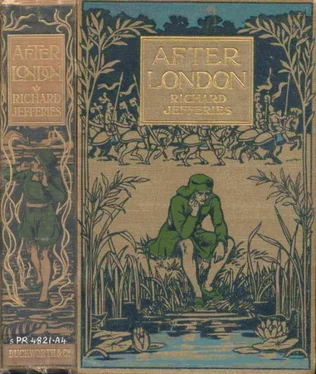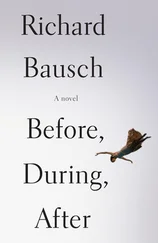Richard Jefferies - After London
Здесь есть возможность читать онлайн «Richard Jefferies - After London» весь текст электронной книги совершенно бесплатно (целиком полную версию без сокращений). В некоторых случаях можно слушать аудио, скачать через торрент в формате fb2 и присутствует краткое содержание. Город: London, Год выпуска: 1905, Издательство: Duckworth & Co., Жанр: sf_postapocalyptic, на английском языке. Описание произведения, (предисловие) а так же отзывы посетителей доступны на портале библиотеки ЛибКат.
- Название:After London
- Автор:
- Издательство:Duckworth & Co.
- Жанр:
- Год:1905
- Город:London
- ISBN:нет данных
- Рейтинг книги:4 / 5. Голосов: 1
-
Избранное:Добавить в избранное
- Отзывы:
-
Ваша оценка:
- 80
- 1
- 2
- 3
- 4
- 5
After London: краткое содержание, описание и аннотация
Предлагаем к чтению аннотацию, описание, краткое содержание или предисловие (зависит от того, что написал сам автор книги «After London»). Если вы не нашли необходимую информацию о книге — напишите в комментариях, мы постараемся отыскать её.
(1885), set in a future in which urban civilization has collapsed after an environmental crisis.” (From
).
This eBook is for the use of anyone anywhere at no cost and with almost no restrictions whatsoever. You may copy it, give it away or re-use it under the terms of the Project Gutenberg License included with this eBook or online at
* * *
After London — читать онлайн бесплатно полную книгу (весь текст) целиком
Ниже представлен текст книги, разбитый по страницам. Система сохранения места последней прочитанной страницы, позволяет с удобством читать онлайн бесплатно книгу «After London», без необходимости каждый раз заново искать на чём Вы остановились. Поставьте закладку, и сможете в любой момент перейти на страницу, на которой закончили чтение.
Интервал:
Закладка:
He now wandered into the centre of the camp, and saw with astonishment groups of retainers everywhere eating, drinking, talking, and even playing cards or dice, but not a single officer of any rank. At last, stopping by the embers of a fire, he asked timidly if he might have breakfast. The soldiers laughed and pointed to a cart behind them, telling him to help himself. The cart was turned with the tail towards the fire, and laden with bread and sides of bacon, slices of which the retainers had been toasting at the embers.
He did as he was bid, and the next minute a soldier, not quite steady on his legs even at that hour, offered him the can, “for,” said he, “you had best drink whilst you may, youngster. There is always plenty of drink and good living at the beginning of a war, and very often not a drop or a bite to be got in the middle of it.” Listening to their talk as he ate his breakfast, Felix found the reason there were no officers about was because most of them had drunk too freely the night before. The king himself, they said, was put to bed as tight as a drum, and it took no small quantity to fill so huge a vessel, for he was a remarkably big man.
After the fatigue of the recent march, they had, in fact, refreshed themselves, and washed down the dust of the track. They thought that this siege was likely to be a very tough business, and congratulated themselves that it was not thirty miles to Aisi, so that so long as they stayed there they might, perhaps, get supplies of provisions with tolerable regularity. “But if you’re over the water, my lad,” said the old fellow with the can, picking his teeth with a twig, “and have got to get your victuals by ship; by George, you may have to eat grass, or gnaw boughs like a horse.”
None of these men wore any arms, except the inevitable knife; their arms were piled against the adjacent booth, bows and quivers, spears, swords, bills and darts, thrown together just as they had cast them aside, and more or less rusty from the dew. Felix thought that had the enemy come suddenly down in force they might have made a clean sweep of the camp, for there were no defences, neither breastwork, nor fosse, nor any set guard. But he forgot that the enemy were quite as ill-organized as the besiegers; probably they were in still greater confusion, for King Isembard was considered one of the greatest military commanders of his age, if not the very greatest.
The only sign of discipline he saw was the careful grooming of some horses, which he rightly guessed to be those ridden by the knights, and the equally careful polishing of pieces of armour before the doors of the huts. He wished now to inquire his way to the king’s levy, but as the question rose to his lips he checked himself, remembering the caution the friendly carters had given him. He therefore determined to walk about the camp till he found some evidence that he was in the immediate neighbourhood of the king.
He rose, stood about a little while to allay any possible suspicion (quite needless precautions, for the soldiers were far too agreeably engaged to take the least notice of him), and then sauntered off with as careless an air as he could assume. Looking about him, first at a forge where the blacksmith was shoeing a horse, then at a grindstone, where a knight’s sword was being sharpened, he was nearly knocked down by a horse, urged at some speed through the crowds. By a rope from the collar, three dead bodies were drawn along the ground, dusty and disfigured by bumping against stone and clod. They were those of slaves, hanged the preceding day, perhaps for pilfering, perhaps for a mere whim, since every baron had power of the gallows.
They were dragged through the camp, and out a few hundred yards beyond, and there left to the crows. This horrible sight, to which the rest were so accustomed and so indifferent that they did not even turn to look at it, deeply shocked him; the drawn and distorted features, the tongues protruding and literally licking the dust, haunted him for long after. Though his father, as a baron, possessed the same power, it had never been exercised during his tenure of the estate, so that Felix had not been hardened to the sight of executions, common enough elsewhere. Upon the Old House estate a species of negative humanity reigned; if the slaves were not emancipated, they were not hanged or cruelly beaten for trifles.
Hastening from the spot, Felix came across the artillery, which consisted of battering rams and immense crossbows; the bows were made from entire trees, or, more properly, poles. He inspected these clumsy contrivances with interest, and entered into a conversation with some men who were fitting up the framework on which a battering ram was to swing. Being extremely conceited with themselves and the knowledge they had acquired from experience only (as the repeated blows of the block drive home the pile), they scarcely answered him. But, presently, as he lent a hand to assist, and bore with their churlishness without reply, they softened, and, as usual, asked him to drink, for here, and throughout the camp, the ale was plentiful, too plentiful for much progress.
Felix took the opportunity and suggested a new form of trigger for the unwieldy crossbows. He saw that as at present discharged it must require some strength, perhaps the united effort of several men, to pull away the bolt or catch. Such an effort must disconcert the aim; these crossbows were worked upon a carriage, and it was difficult to keep the carriage steady even when stakes were inserted by the low wheels. It occurred to him at once that the catch could be depressed by a lever, so that one man could discharge the bow by a mere pressure of the hand, and without interfering with the aim. The men soon understood him, and acknowledged that it would be a great improvement. One, who was the leader of the gang, thought it so valuable an idea that he went off at once to communicate with the lieutenant, who would in his turn carry the matter to Baron Ingulph, Master of the Artillery.
The others congratulated him, and asked to share in the reward that would be given to him for this invention. To whose “war” did he belong? Felix answered, after a little hesitation, to the king’s levy. At this they whispered among themselves, and Felix, again remembering the carters’ caution, said that he must attend the muster (this was a pure guess), but that he would return directly afterwards. Never for a moment suspecting that he would avoid the reward they looked upon as certain, they made no opposition, and he hurried away. Pushing through the groups, and not in the least knowing where he was going, Felix stumbled at last upon the king’s quarters.
CHAPTER XVIII
THE KING’S LEVY
The king’s booth stood apart from the rest; it was not much larger, but properly thatched with straw, and the wide doorway hung with purple curtains. Two standards stood beside it; one much higher than the other. The tallest bore the ensign of the kingdom; the lesser, the king’s own private banner as a knight. A breastwork encircled the booth, enclosing a space about seventy yards in diameter, with a fosse, and stakes so planted as to repel assailants. There was but one gateway, opposite the general camp, and this was guarded by soldiers fully armed. A knight on horseback in armour, except his helmet, rode slowly up and down before the gate; he was the officer of the guard. His retainers, some thirty or forty men, were drawn up close by.
A distance of fifty yards intervened between this entrenchment and the camp, and was kept clear. Within the entrenchment Felix could see a number of gentlemen, and several horses caparisoned, but from the absence of noise and the fact that every one appeared to walk daintily and on tiptoe, he concluded that the king was still sleeping. The stream ran beside the entrenchment, and between it and the city; the king’s quarters were at that corner of the camp highest up the brook, so that the water might not be fouled before it reached him.
Читать дальшеИнтервал:
Закладка:
Похожие книги на «After London»
Представляем Вашему вниманию похожие книги на «After London» списком для выбора. Мы отобрали схожую по названию и смыслу литературу в надежде предоставить читателям больше вариантов отыскать новые, интересные, ещё непрочитанные произведения.
Обсуждение, отзывы о книге «After London» и просто собственные мнения читателей. Оставьте ваши комментарии, напишите, что Вы думаете о произведении, его смысле или главных героях. Укажите что конкретно понравилось, а что нет, и почему Вы так считаете.












